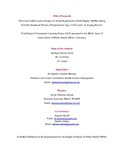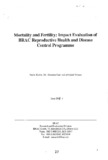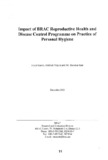| dc.contributor.advisor | Hossain, Shaikh A Shahed | |
| dc.contributor.author | Oishi, Shafiqua Nawrin | |
| dc.date.accessioned | 2023-07-18T10:15:09Z | |
| dc.date.available | 2023-07-18T10:15:09Z | |
| dc.date.copyright | 2023 | |
| dc.date.issued | 2023 | |
| dc.identifier.other | ID 22167014 | |
| dc.identifier.uri | http://hdl.handle.net/10361/18903 | |
| dc.description | This project report is submitted in partial fulfillment of the requirements for the degree of Master of Public Health (MPH), 2023. | en_US |
| dc.description | Cataloged from the PDF version of the project report. | |
| dc.description | Includes bibliographical references (pages 24-27). | |
| dc.description.abstract | Introduction:
With growing political instability, war and conflict has been disrupting the access to SRHR
service and in some cases, they are left neglected. Even though the international agencies have
provided relevant guidance, there is still no agreement on the effective way to provide Sexual
Reproductive Health (SRH) services in the humanitarian settings. Thus, this study will explore
the impact of forced displacement due to war and conflict on Sexual Reproductive Health Right
(SRHR) of the displaced women of reproductive age
Method:
This study adhered the guidelines of Preferred Reporting Items for Systematic Reviews and
Meta-Analyses (PRISMA) for systematic reviews. Indexed Articles from databases such as
PubMed, Scopus, and Google Scholar were methodically searched in addition to other sources
and grey literatures by two reviewers independently step by step based on a pre-determined
inclusion and exclusion criteria. A total of 285 record were screened of which 15 studies were
included.
Findings:
15 studies were included in this review from 17 countries covering Asia and African Among the
15 studies, 2 were literature review, 1 qualitative study, 8 quantitative study, 1 policy review and
3 mixed-method studies design. Findings suggest, regardless of policies in place, due to lack of
proper utilization, women displaced due to war or conflict are not receiving SRH services to the
full. However, some of the effective community-based interventions can help the update of SRH
services. In addition, issues like transactional sex work among female in the conflict affected
settings are underrated thus gap remains in appropriate measures and intervention dedicated for
them.
Conclusion:
The review was able to highlight some of the effective interventions across the humanitarian
setting focusing on SRH for women. Community based approach has been at the heart of all the
progress in SRH service and intervention. | en_US |
| dc.description.statementofresponsibility | Oishi, Shafiqua Nawrin | |
| dc.format.extent | 41 pages | |
| dc.language.iso | en | en_US |
| dc.publisher | Brac University | en_US |
| dc.rights | Brac University project reports are protected by copyright. They may be viewed from this source for any purpose, but reproduction or distribution in any format is prohibited without written permission. | |
| dc.subject | Sexual Reproductive Health (SRH) | en_US |
| dc.subject | Women of reproductive age | en_US |
| dc.subject | Sexual Reproductive Health Rights (SRHR) | en_US |
| dc.subject.lcsh | Reproductive health | |
| dc.subject.lcsh | Teenagers--Health and hygiene | |
| dc.subject.lcsh | Sexual rights | |
| dc.title | Wars and Conflicts and its Impact on Sexual Reproductive Health Rights (SRHR) among forcibly displaced women of reproductive age (15-49 years): a scoping review | en_US |
| dc.type | Project report | en_US |
| dc.contributor.department | James P Grant School of Public Health, Brac University | |
| dc.description.degree | M. Public Health | |




